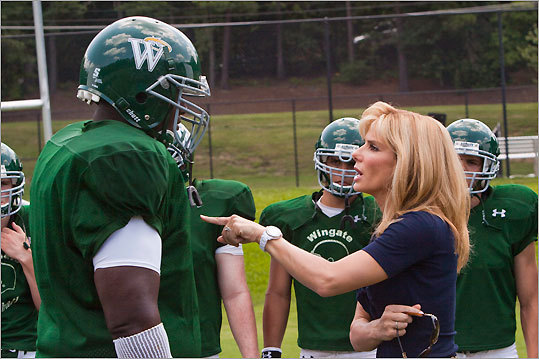
We can get the obvious out of the way first; Sandra Bullock is fantastic in THE BLIND SIDE. I still think she was better in "Crash," but her transformation here feels physical as well as emotional. She, along with a scene-stealing turn by Jae Head as her son, S.J., is the only real reason to see THE BLIND SIDE, an entirely safe slab of cinematic comfort food that, I fear, takes the very interesting story of a young African-American man struggling to get out of the depths and turns it instead into a movie about a white woman who is wonderful enough to save him.
It's interesting that I'm writing about this on Martin Luther King, Jr. Day, and while I'm sure that my last comment might upset some people or even force them to accuse me of something that I might not be politically or socially, hear me out. I am not going to argue what I've read before - that THE BLIND SIDE is really the story of Michael Oher and not Leigh Anne Tuohy, the well-to-do, conservative, Christian woman who takes him in and encourages him to be a football player. It's very clear that this film specifically makes Tuohy the focus of the narrative and not Oher, and it is what it is. I have no interest in engaging in a poitical discussion about how movies time and again show whites as the saviors of blacks, coming to their rescue and improving their lives. Because, let's face it, sometimes that does happen, though certainly Hollywood's portrayal of those moments is disproportional to reality.
My beef on this issue with THE BLIND SIDE is purely a narrative and dramatic one. In my mind, had the film centered more on Oher, the film would have been less flat, less typical and more interesting. What was it like for Oher to get into the Tuohy's car that first night? What was it like to look around the family's living room when he spent his first night there? Could he even sleep? Did he really want to play football? It looked like he was more interested in basketball...did the conservative Tuohys consider basketball to be too stereotypically black a sport and not a real way out? Did Oher feel forced into football? The questions in my mind go on and on, and none of them were answered because Oher was on the periphery of the narrative. Everytime the film approached a dramatically-interesting moment involving his struggles in a school he didn't belong in or a place he didn't feel comfortable in, the film would cut back to Leigh Anne.
Because this film is about Leigh Anne and not Michael, none of these interesting dynamics are explored, leaving the only real conflict in this film to be that of her image in the eyes of her friends who are shocked that a big black boy is living in her house in the room right next to her white, teenage daughter. The horror!
I know I'm coming down hard on THE BLIND SIDE, but it's frustrating to think how much more engaging and interesting this film could have been, because the story is as inspiring and uplifting as everyone says it is. And, as I said before, Bullock is great. She does not overplay her scenes for melodrama: erring on the side of a tough and occasional catch in the throat instead of slamming her back to a hallway wall and sobbing over what Michael doesn't have. You buy her, through and through, and at every moment.
I bought newcomer Quinton Aaron a little less as Oher, but he was probably enough for this film, given that he was not truly the focus. The version of the story in my mind would have been a lot more demanding on the actor playing that role, and Aaron is not asked to convey much more than bewilderment and tentativeness, which he does effectively. This could have been a tale of a young man's struggle in the vein of the struggle of the young woman in "Precious," but it isn't.
I would be lying if I said I wasn't completely engaged in THE BLIND SIDE, even uplifted by its depiction of beautiful Christian charity. I love the message that family is anyone who's "got your back" and not necessarily those related by blood. I have always felt called to one day adopt myself, and this film's themes resonated with me on a heartwarming and profound level. Perhaps my criticism is unfair; ultimately, I should accept THE BLIND SIDE for what it was intented to be - a mainstream, middle America, feel-good crowd pleaser of a film. It is certainly this, and certainly effective as this.
It is also certainly true that we need films that uplift the human spirit, and THE BLIND SIDE delivers. But I worry about the cost at which it does so. Tribune critic Michael Phillips described the film as "poverty tourism." Other critics have stated that it replaces gritty realism with cliches at every turn and that it's a "feel good film that never stops feeling good." I have to agree with these sentiments. It is a film that lacks depth and levels, delivered with assuredness and heart so that you can't exactly hate it.
I didn't hate THE BLIND SIDE. Not at all. But I wanted so much more from it than what I got. No offense to director John Lee Hancock, but maybe this film only further points out the need for more work for black directors in Hollywood. Even the real Michael Oher has hesitated to say much in support of the film. But in the hands of better artists, maybe THE BLIND SIDE and the fantastic work by Sandra Bullock could have really turned some heads.
2.0 out of 4
No comments:
Post a Comment